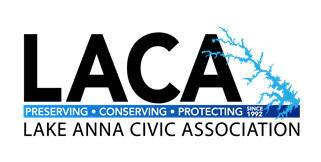By LACA Water Quality Committee and Virginia Tech Schmale Lab - September 2020
LACA has a fantastic academic partnership with Dr. David Schmale and members of his Schmale Lab team at Virginia Tech (https://www.schmalelab.spes.vt.edu/) that is adding significantly to our understanding of the Harmful Algae Bloom (HAB) issues we have experienced the past three recreational seasons (2018, 2019 and 2020). The Water Quality Committee is working with The Schmale Lab, part of the Virginia Tech School of Plant and Environmental Sciences, to collect cyanobacteria data that will add to our growing database of information about the extent and make-up of the algae blooms here at Lake Anna. The Schmale Lab researchers utilize drones to further their understanding of why HABs are forming on the lake. The research at Lake Anna is part of a broader research effort conducted by the Schmale Lab to understand water quality in freshwater lakes, HABs and the long-distance transport of microorganisms in the atmosphere.
Members of the Schmale Lab continued their work with drones to collect water samples at Lake Anna this past June and July.  The work this year is a continuation of the 120 drone water samples the Schmale Lab collected and analyzed from Lake Anna during the summer of 2019.
The work this year is a continuation of the 120 drone water samples the Schmale Lab collected and analyzed from Lake Anna during the summer of 2019.
These 120 samples were collected using a unique 3D-printed sampling device attached to the drone. Operations in 2019 spanned the upper portions of the lake as well as mid-lake and lower lake sites near the Waste Heat Treatment Facility. Samples were analyzed for cyanotoxins, phycocyanin (a pigment used to estimate the presence of cyanobacteria), and nutrient levels.
Recent sampling efforts by the Schmale Lab team focused on land-based operations on the northern branches of Lake Anna. Water samples were collected near the shoreline and along transects extending 100 meters from the shore. Ground-based instruments were also deployed at these sites to capture potential cyanobacteria and toxins in the air, and wind profiles were estimated with drones up to about 80 meters above ground level. We appreciate the assistance of all the Lake Anna homeowners that allowed the Virginia Tech researchers access to their land to conduct these collections.
The Schmale Lab partnership with LACA also includes major support of our own internal algae monitoring program that was started in May 2020. Members of the LACA Water Quality Committee collect samples every week at stations across the lake. LACA identified 28 primary stations for monitoring this year and we sample about a third of them each week. Water samples are collected for analysis by LACA using new instruments purchased in the spring that allow us to generate estimates of the relative quantities of cyanobacteria in the water as well as the amount of two types of toxins that may be present in samples that indicate a high level of cyanobacteria. In addition to the analysis conducted by LACA, a part of each sample collected by LACA is saved and frozen for analysis at the Schmale Lab. We also share all our data with Virginia Tech and with the interested HAB stakeholders like the Virginia Department of Health (VDH), the Virginia Department of Environmental Quality (DEQ) and the United States Geological Survey (USGS). Maps and data plots of our algae analysis are available on the LACA website under the Water Quality Data page (https://laca.wildapricot.org/Water-Quality-Data). All of this work is adding extensively to our understanding of the problem and provides a science and analysis-based foundation to the actions we take to counter the HAB issues.
Work conducted by the Schmale Lab at Lake Anna is supported by grants from Virginia Tech and the National Robotics Initiative in the Division of Information and Intelligent Systems of the National Science Foundation.
Authors: Regina Hanlon, Javier Gonzalez-Rocha, Hope Gruszewski, and David Schmale, School of Plant and Environmental Sciences, Virginia Tech, Blacksburg, VA, 24061 and Harry Looney, LACA Water Quality Project Officer.
